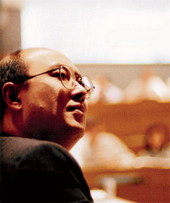Overheard at MIT: Why Economics Isn’t Like Physics
Finance professor Andrew Lo addresses “physics envy” among economists — and the importance of understanding the levels of uncertainty you face.

Andrew W. Lo
What is physics envy — and why do many economists have it?
Physics envy is the “desire to be able to explain 99% of all economic phenomena with three laws. That’s what physicists can do [in physics]. In fact, [in economics] we have 99 laws that explain maybe 3% of all phenomena.”
That’s what Andrew W. Lo, the Harris & Harris Group Professor of Finance at the MIT Sloan School of Management said, speaking on the MIT campus earlier this year. In his talk, titled “Warning: Physics Envy May Be Hazardous to Your Wealth!,” Lo traced the origins of economists’ “physics envy” and suggested that it is widespread in contemporary economics. “We all suffer from it,” he said. “It’s in our DNA.”
But there’s a problem with physics envy. Economics often deals with situations that have significantly more uncertainty than those physics addresses. And when economists use techniques that are inappropriate for the level of uncertainty that economics often involves, “we come to conclusions we ought not to,” Lo noted.
What does this mean for businesspeople?
- View a video of Lo’s talk.
- Download a copy of Lo and Mueller’s “Warning: Physics Envy May Be Hazardous to Your Wealth!” working paper, which contains their Uncertainty Checklist.
Lo thinks managers should analyze the uncertainty levels that apply to various components of their business — and look at all the levels of uncertainty together. In the working paper on which Lo’s talk was based, Lo and Mark T. Mueller, a senior lecturer at the MIT Sloan School and a visiting scientist at the MIT Department of Physics, have defined five levels of uncertainty ranging from Level 1, where there’s complete certainty, to Level 5, where there’s total ignorance that no amount of data can remedy, which they call “irreducible uncertainty.”
Lo and Mueller provide a tool they created to address this challenge, called an “Uncertainty Checklist,” which is essentially a framework managers can use to force themselves to break down the different aspects of their business and assign levels of uncertainty to them.
